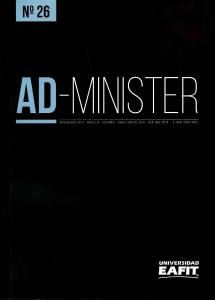University and sustainability: a theoretical approach for implementation
Main Article Content
Keywords
sustainable campus, implementation, sustainable development, universities
Abstract
This paper aims to review the theoretical and instrumental aspects involved in the implementation of sustainability in universities as well as make a proposal for its management. Through the review of scientific literature on the relationship between sustainability and operational and substantive functions of universities, a logical-instrumental mechanism is proposed to put in place the components of sustainable development. The university environmental management system, the engagement of stakeholders as well as the use of teaching and research resources are proposed as stepping stones on the path allowing universities to move to sustainability. The paper provides a contribution in the area of sustainability for universities located in emerging countries by proposing an implementation model called “sustainable campus”.
JEL Classification: M14, Q01.
Downloads
References
CMMAD. (1987). Nuestro futuro común. Madrid: Alianza Editorial.
Castro, R., & Jabbour, C. (2013). Evaluating sustainability of an Indian university. Journal of Cleaner Production, 61, 54-58.
Cole, L. (2003). Assessing sustainability on Canadian University campuses: development of a campus sustainability assessment framework. Canadá: Royal Roads University. Recuperado de http://neumann.hec.ca/humaniterre/campus_durable/campus_memoire.pdf
Cortina, A. (2003). Construir confianza. Ética de la empresa en la sociedad de la información y las comunicaciones. Buenos Aires: Editorial Trotta.
Cortina, A. (enero-marzo, 2005). Ética de la Empresa, no sólo responsabilidad social. Revista Empresa, 11, 40-49.
DESD-UN. (2010). Decade of Education for Sustainable Development. United Nations. Recuperado de http://www.desd.org
Ferrer, D., Lozano, R., Huisingh, D., Buckland, H., Ysern, P., & Zilahy, G. (2010). Going beyond the rhetoric: system-wide changes in universities for sustainable societies. Journal of Cleaner Production, 18, 607-610.
González, É., & Gutiérrez, E. (2010). De las teorías del desarrollo al desarrollo sustentable: construcción de un enfoque multidisciplinario. México: Siglo XXI Editores-Universidad Autónoma de Nuevo León.
Jabbour, C. (2010). Greening of business schools: a systemic view. International
Journal of Sustainability in Higher Education, 11(1), 49-60. doi: 10.1108/14676371011010048
Jabbour, C., Sarkis, J., Sousa, A., & Govindan, K. (2013). Understanding the process of greening of Brazilian business schools. Journal of Cleaner Production, 61, 25-35.
Lélé, S. (1991). Sustainable Development: A Critical Review. World Development. Recuperado de http://atree.org/sites/default/files/pubs/slele/journalpublications/Lele_SusDev_review_WDev.pdf
Melamed, A. (2012). Empresas más humanas. Buenos Aires: Editorial Planeta.
Morrow, D., & Rondinelli, D. (2002). Adopting corporate environmentalmanagement systems: motivations and results of ISO 14001 and EMAS certification. European Management Journal, 2(20), 159-171.
Paton, J. (2008). What´s left of sustainable development. Journal of Australian Political Economy, 62, 94-119.
Riechmann, J. (2005). Sostenibilidad: algunas reflexiones básicas. Recuperado de http://www.upf.edu/materials/polietica/_pdf/sossostenibilidadreflexiones.pdf
Saadatian, O., Salleh, E., Tahir, O., & Dola, K. (2009). Observations of sustainability practices in Malaysian research universities: highlighting particular strengths. Pertanika Journal of Social Sciences & Humanities, 2(17), 293-312. Recuperado de http://works.bepress.com/omidreza_saadatian/2
Simkins, G., & Nolan, A. (2004). Environmental management system in universities. Occasional paper for the environmental association for universities and colleges. (EAUC). Recuperado de http://www.eauc.org.uk/sorted/files/ems_eauc_paper_1.pdf.
Trujillo, H. (2012). Biodiversidad y recursos abióticos en la Amazonía colombiana: tensiones, perspectivas y búsqueda de la sostenibilidad (Tesis de maestría). Instituto Tecnológico y de Estudios Superiores de Monterrey, Estado de México, México.
UNESCO. (1993).The Swansea Declaration. UNESCO. Recuperado de https://www.iisd.org/educate/declarat/swansea.htm
Vallaeys, F. (2005). La responsabilidad social de la Universidad. Recuperado de http://aiesmin.unsl.edu.ar/responsabilidad.pdf
Vallaeys, F. (2008). ¿Qué es la Responsabilidad Social Universitaria? Recuperado de http://www.url.edu.gt/PortalURL/Archivos/09/Archivos/Responsabilidad_Social_Universitaria.pdf
Vásquez, A. (2008). Zygmunt Bauman: modernidad líquida y fragilidad humana. Revista Nómadas, 19(3). Recuperado de http://pendientedemigracion.ucm.es/info/nomadas/19/avrocca2.pdf
Velázquez, L., Munguia, N., Platt, A., & Taddei, J. (2006). Sustainable university: what can be the matter? Journal of Cleaner Production, 14, 810-819.
World Business Council for Sustainable Development (WBCSD). (2002). Sustainable Development Reporting: Striking the Balance. Geneva: World Business Council for Sustainable Development.

